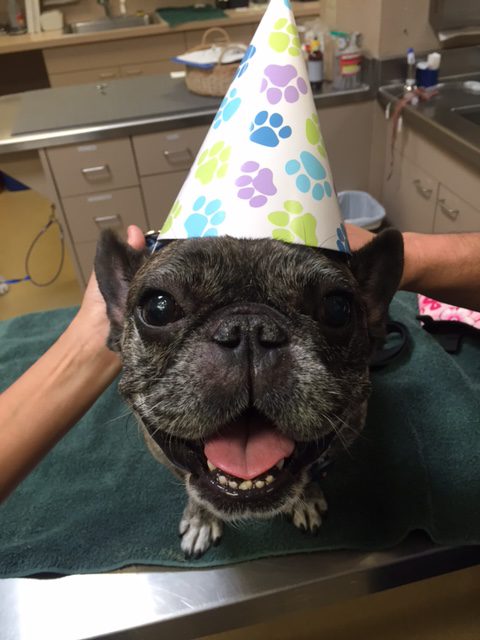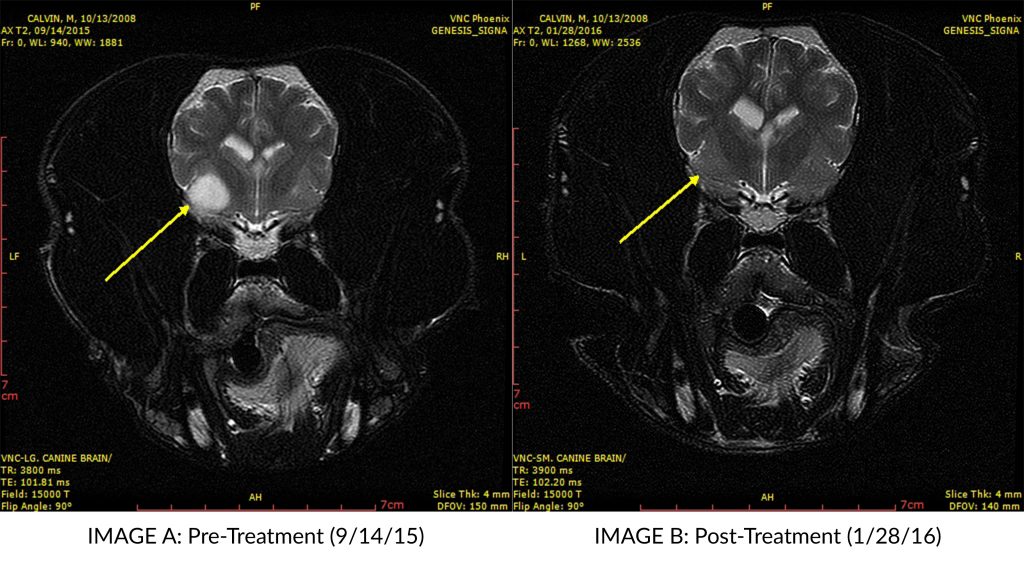Calvin, a French Bulldog, Thrives Following Treatment of Brain Tumor via New Technology: Stereotactic Radiosurgery

Gilbert, AZ – May 5, 2016 – As the world celebrates National Brain Tumor Awareness Month this May, brain tumor survivor Calvin, an eight-year-old canine belonging to Gretchen and David May of Scottsdale, is happily playing with his favorite toy “crunchy bone” and chasing his French Bulldog sister Olive around the house.
Not long ago, such a scene seemed impossible. But thanks to revolutionary advancements in veterinary medicine and a new treatment option called stereotactic radiosurgery (SRS), Calvin is happy, healthy and living life to the fullest.
“He’s our little miracle dog,” said Gretchen. “Calvin and Olive are our kids. We would do anything for them. We feel incredibly lucky that we had access to SRS here in Arizona.”
Already proven successful in human medicine, SRS is now available for pets and providing newfound hope in the fight against cancer. In addition to being delivered with the intent to cure, rather than merely ease the symptoms of cancer, the significant benefits of SRS include:
- More types of cancer can be treated including some forms previously considered “untreatable” based on their delicate locations within the body – including the brain.
- It is a noninvasive, nonsurgical treatment.
- It is delivered with submillimeter precision, maximizing damage to cancerous tissue while minimizing collateral damage to nearby healthy tissue, thus significantly reducing side effects.
- The unprecedented precision enables treatment in just 1-3 sessions compared to 15-21 with conventional radiation therapy, thereby decreasing anesthetic events and patient risk while optimizing client convenience.
Calvin’s survivor story began on a Sunday afternoon last September when Gretchen noticed Calvin having a seizure. He was shaking and foaming at the mouth. A trip to the emergency room for overnight observation was followed by a visit to his primary care veterinarian, Travis Nick, DVM, of Scottsdale Ranch Animal Hospital, for evaluation. After some preliminary testing, Calvin was referred to a veterinary neurologist, Jason Evans, MS, DVM, DACVIM (Neurology), at Veterinary Neurological Center in Phoenix, Arizona. There, MRI results revealed that Calvin had a malignant brain tumor.
Dr. Evans referred the Mays to PetCure Oncology at Arizona Veterinary Oncology (AVO) in Gilbert, Arizona for further evaluation by board-certified radiation oncologist Eric Boshoven, DVM, DACVR (RO). After reviewing Calvin’s history and performing a comprehensive exam, Dr. Boshoven walked the Mays through all of their available treatment options. Ultimately, he recommended treating the tumor with SRS rather than surgery or chemotherapy.
“Calvin successfully completed three SRS sessions,” said Dr. Boshoven. “He suffered a small seizure after his first treatment but none since. Aside from experiencing a slight lightening of his coat, he has had no side effects. An MRI at four months post-treatment showed virtually no sign of the tumor.”

Seizures are the most common indication of brain tumors in dogs. Other symptoms may include unusual behavior or temperament, vision problems, movement in circles, uncoordinated movement, unsteady gait, lack of appetite, inappropriate urination and/or lethargy. While brain tumors in cats are less common, they may display the same symptoms as dogs along with head pressing and unusual meowing.
About PetCure Oncology
PetCure Oncology’s national network of veterinary cancer care centers specializing in SRS includes Arizona Veterinary Oncology in Gilbert, Arizona; the Veterinary Radiosurgery and Imaging Center in Clifton, New Jersey; and Lakeshore Veterinary Specialists in Milwaukee, Wisconsin. Additional centers across the country are in various stages of development. Visit PetCureOncology.com for more information.
RELATED: Cancer in Dogs, Brain Cancer in Dogs
